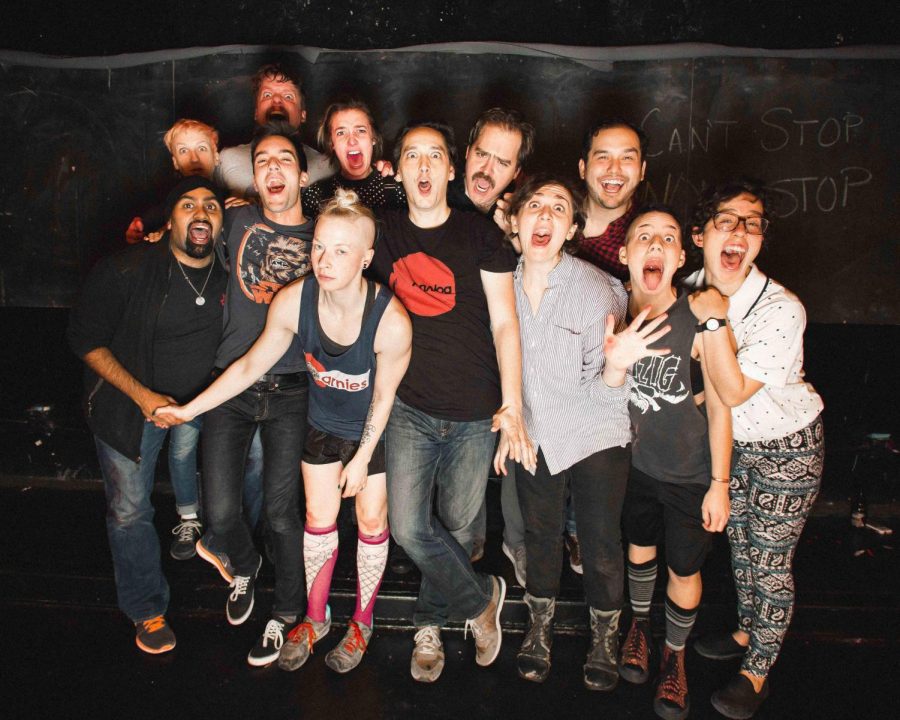The new future of The Neo-Futurists
The Neo-Futurists change their long-running show “Too Much Light Makes The Baby Go Blind” to “The Infinite Wrench” after 28 years at The Neo-Futurarium, 5153 N. Ashland Ave.
March 13, 2017
After nearly 30 years on the local theater scene, the Neo-Futurists theater ensemble is taking its winning formula of 30 plays in 60 minutes in a different direction.
The new format, “The Infinite Wrench,” which debuted March 3, replaces “Too Much Light Makes The Baby Go Blind,” the name the company gave to its long-running performance of a series of two-minute plays first offered in 1988.
Like the previous show, the new one is scripted by the ensemble members and changes weekly, but it has a more flexible structure and now incorporates audience participation, according to Lily Mooney, an ensemble member since 2013 and the education coordinator.
Artistic director and performer Kurt Chiang said the reason for the new direction of the group was to increase audience involvement and allow the ensemble to use the audience and props more.
In addition, the license for the previous show expired and was not renewable, Mooney said. Renaming the show was necessary but also conveys the plays’ participatory dynamic, she said.
Incorporating audience participation into a rapid-fire succession of plays would seem to be a formidable task, but the troupe has found a way to make it work. According to Chiang, the audience always determines the order of the plays, often by competing with one another in various ways to decide which plays are performed when throughout the show.
“The reason we wanted to do that was because we could,” Chiang said. “We wanted to experiment further with the way that we were doing our work that we’ve been doing almost exactly the same in a way since 1988 and it was time to make anew.”
In addition to the new show, the Neo-Futurists are also en route to reach their 10,000th play, a big milestone in the Neo-Futurists’ 28-year history. Each mini-play is different every time it is performed, and the plays are based on the writers’ experiences and observations. The group performs at The Neo-Futurarium, 5153 N. Ashland Ave.
“In my time here, I have seen the moment when the 7,000th play was picked and the 8,000th play was picked and the 9,000th play. It is a big milestone,” Chiang said. “It is a good testament to the entire ensemble that has performed and written for our company since 1988. It is a big round number, and we get to land ourselves into the five-digit spectrum now.”
The name of the new collection of shows was inspired by British artist Mina Loy’s 1914 book “Feminist Manifesto,” an allusion to the Italian Futurists for whom the ensemble is named, according to Chiang.
“[Loy] has a line in the Manifesto that says, ‘Are you prepared for the wrench?’” Chiang said. “[It’s] a reference to a violent change to the way identity politics were going to go according to her manifesto.”
The Neo-Futurists are attempting to change the live performance experience by discussing social and political occurrences while performing, according to Chiang.
“We have a privileged position where we can speak and write toward the present day through theater,” Chiang said.
The group also has an access initiative called Neo-Access that makes the theater available to many different types of audiences, including those with limited to the arts, such as people with various disabilities, Mooney said.
“A big part of our work, and our belief about our work, is that you don’t need a certain kind of experience or training to be yourself onstage or tell true stories,” Mooney said. “We don’t want there to be barriers to people who want to do this work.”
As it reaches the 10,000 record for mini-plays this year, the Neo-Futurists ensemble approaches performances by “staying within reality while still being theatrically vibrant and versatile,” said Bilal Dardai, an ensemble member from 2004–2008.
“The important thing for each of those plays where we write from was by being in a place of personal honesty,” Dardai said. “Any story we told about ourselves or about things we saw in the news had to be 100 percent true. We were not going to make anything up, we weren’t going to make up any fictional characters, and we weren’t going to pretend that we were anyone else.”








